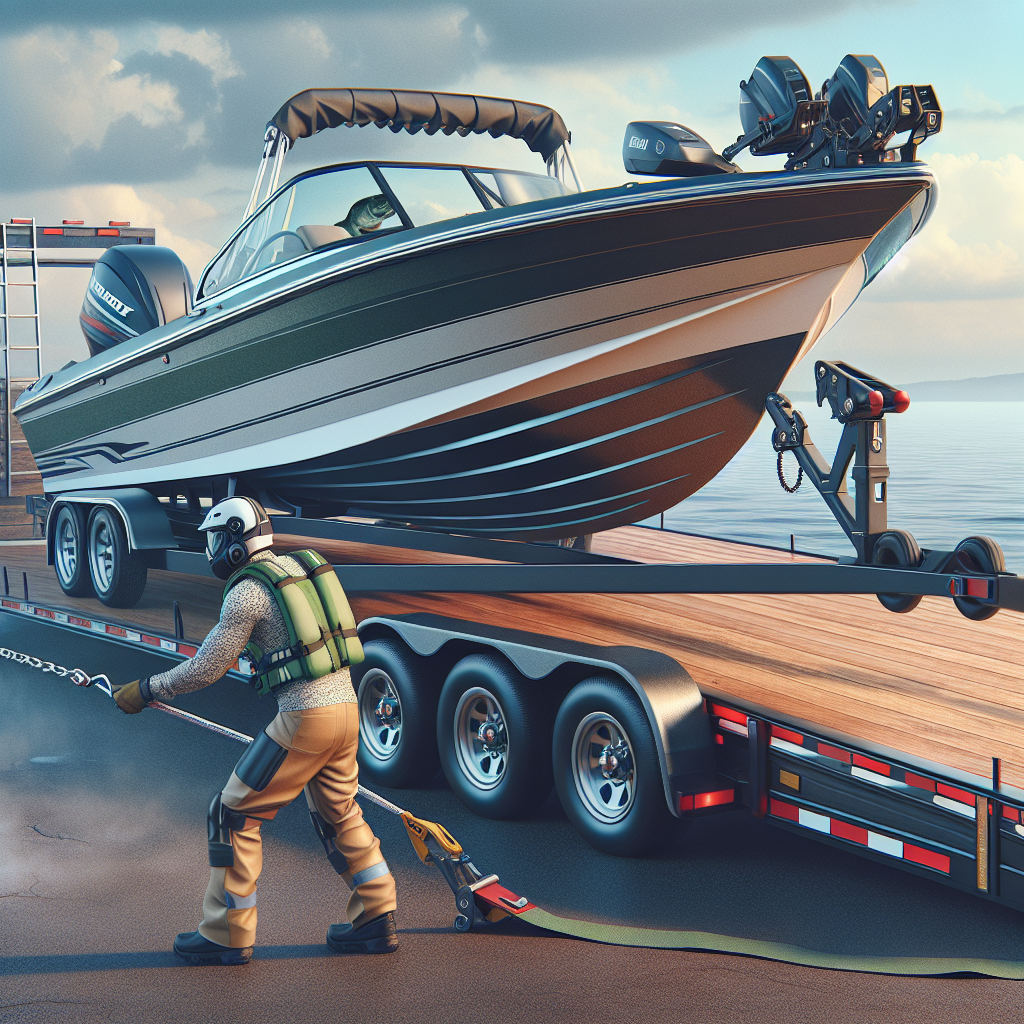Understanding the Importance of Safely Lifting Your Bass Boat Off the Trailer
Properly lifting your bass boat off the trailer is not only important for the safety of yourself and your boat but also for maintaining the trailer’s lifespan. By taking a few simple steps, you can ensure that accidents and damage are prevented, and efficient usage of your boat is guaranteed.
1.1. Prevention of Accidents and Damage to Your Boat
Accidents and damage to your boat can occur when it is not properly lifted off the trailer. The boat can fall, resulting in serious injuries or damaging the boat beyond repair. By properly lifting the boat, you eliminate these risks.
1.2. Increasing the Lifespan of Your Bass Boat Trailer
The trailer’s lifespan is often shortened when the boat is not properly lifted off it. The boat’s weight can cause damage to the trailer’s tires, bearings, and suspension. Proper lifting ensures that the trailer is not damaged and increases its lifespan.
1.3. Ensuring Efficient Handling and Usage of the Boat
Properly lifting your bass boat off the trailer ensures efficient handling and usage of the boat. The boat’s positioning is crucial for its performance, and by properly lifting it, you guarantee its effectiveness and prolonged useful life.
Initial Safety Checks Before Lifting Your Bass Boat Off the Trailer
Before attempting to lift your bass boat off the trailer, it is crucial to carry out some essential safety checks. These checks will ensure that your boat is secure and prevent any accidents or damage during the lifting process.
2.1. Checking the Condition of the Trailer and Boat
Inspect your boat and trailer to ensure they are in good condition and free from any damages that may make lifting unsafe. Check the following:
- Trailer tires and brakes
- Bearing and axles
- Trailer lights and wiring
- Boat engine, steering, and fuel system
2.2. The Right Positioning of the Trailer
Proper positioning of the trailer helps ensure safe lifting. The trailer should be positioned correctly for easy access to both the winch and boat. Ensure that the hitch coupler is properly attached and locked in place before engaging the winch.
2.3. Necessary Equipment and Safety Gear
You will need specific equipment and safety gear before starting the lifting process, including:
- A good quality winch with straps or ropes for lifting the boat
- Protective gloves and goggles
- A boat jack or blocks for stabilizing the boat during the lifting process
- Safety chains or ropes for securing the boat to the trailer
- A checklist to ensure you have everything required for safe lifting
Carrying out these initial safety checks provides a solid foundation for lifting your bass boat off the trailer safely. In the next section, we look at the lifting process, which is the core of this article.
Handling Common Challenges in Bass Boat Lifting
4.1. Dealing with a stuck boat
Do not force the boat off the trailer if it appears to be stuck. This could cause damage to both the boat and the trailer. Instead, try the following techniques to loosen the boat:
- Rock the boat gently back and forth using the trailer’s winch while someone else watches the rear of the boat for signs of movement.
- Back the trailer into the water slightly, then apply the brakes firmly. Release the brakes and try to pull the trailer out of the water to see if the boat releases.
- Use ramps or blocks to raise the trailer slightly off the ground, then try winching the boat off again.
4.2. Working under adverse weather conditions
Always keep a close eye on the weather forecast before attempting to lift your bass boat off the trailer. Avoid working in high winds or heavy rain, as these conditions can make boat lifting challenging and dangerous. If you must lift your boat in less-than-ideal weather conditions, make sure to follow these safety tips:
- Wear appropriate clothing and footwear to keep yourself warm and dry.
- Ensure that your footing and the trailer’s wheels are secure and stable at all times.
- Use extra caution when maneuvering the boat off the trailer, as wet conditions can make the boat more slippery and difficult to handle.
4.3. Addressing problems of inadequate space
If you are working with limited space, it’s important to take extra precautions to ensure safety during boat lifting. Consider the following tips:
- Use mirrors to help you see where you’re going when backing up the trailer.
- Use a spotter to help guide you when parking the trailer in tight spaces.
- Remove any obstacles near the trailer that could impede movement during boat lifting.
By following these methods, you will be able to overcome some common challenges that can arise when lifting your bass boat off the trailer, minimize the risk of damage or accidents, and enjoy a safe and successful boating experience. Remember, always prioritize safety when handling your boat.
Maintaining Your Bass Boat and Trailer for Easier Lifting
Lifting your bass boat off the trailer can be a cumbersome task that requires careful planning, preparation, and execution. Once you have safely lifted your boat, it is equally important to maintain your boat and trailer for easier lifting the next time. Here are some tips to help you maintain your boat and trailer:
5.1. Regular inspection and maintenance
- Conduct regular inspections of your boat and trailer to identify any issues that may affect the lifting process.
- Check the condition of the winch straps, lights, tires, brakes, bearings, and axles to ensure they are in good working condition.
- Maintain a log to keep track of the maintenance history of your boat and trailer, including the dates and services performed.
5.2. Proper storage and protective measures
- Store your boat and trailer in a dry and secure location, away from harsh weather elements, such as rain, snow, and sun.
- Cover your boat and trailer with a suitable cover that provides adequate protection against environmental elements and critters.
- Wash your boat and trailer regularly to remove salt, grime, and debris that may corrode the metal components and affect the lifting process.
5.3. Ensuring useful life and effectiveness of lifting equipment
- Replace your winch straps and ropes every few years, or as recommended by the manufacturer, to ensure that they are strong enough to lift your boat.
- Lubricate the winch, rollers, and other metal components with a suitable lubricant to reduce friction, wear, and tear during the lifting process.
- Upgrade your lifting equipment as necessary to keep pace with your boat and trailer’s weight, size, and condition. Consider investing in high-quality winch straps, cable, and other accessories to improve safety and efficiency.
Key Takeaways
- Inspect and maintain your boat and trailer regularly to prevent any issues that may affect the lifting process.
- Store your boat and trailer in a dry and secure location, away from environmental elements and critters.
- Replace your lifting equipment as necessary and upgrade to high-quality accessories for improved safety and efficiency.
Frequently Asked Questions
1. What are some of the common issues that may affect the lifting process?
Some of the common issues include loose or damaged winch straps, flat tires, corroded metal components, and improper trailer positioning.
2. How often should I wash my boat and trailer to prevent corrosion?
You should wash your boat and trailer regularly, at least once a month, or as recommended by the manufacturer, to remove salt, grime and debris that may corrode the metal components.
3. How do I know if my lifting equipment needs an upgrade?
You should upgrade your lifting equipment if it struggles to lift your boat effortlessly, is noisy, or is too slow. Look out for signs of wear and tear, such as frayed winch straps, and replace them as necessary.


